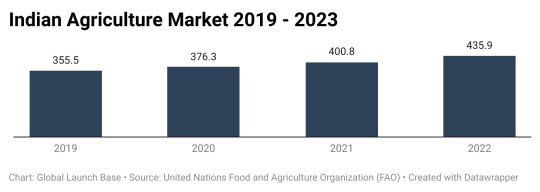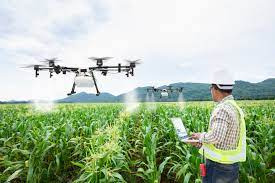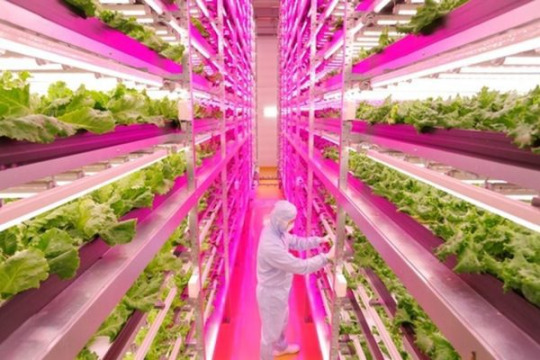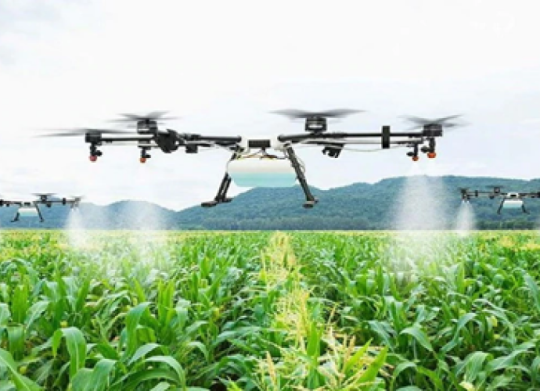#GlobalFarmingPractices
Explore tagged Tumblr posts
Text
Bringing International farming Technologies into Indian Agriculture

Written By: Jagriti Shahi
Introduction
India, with its rich agricultural heritage and vast arable land, has long been regarded as the breadbasket of the world. However, the sector faces numerous challenges ranging from fragmented landholdings and water scarcity to soil degradation and yield stagnation. In the face of these challenges, there is an urgent need to modernize and revitalise Indian agriculture to ensure food security, livelihood sustainability, and environmental stewardship. Embracing international farming technologies presents a compelling opportunity to catalyse this transformation and unlock the full potential of India's agricultural sector. By drawing upon global innovations in precision agriculture, vertical farming, hydroponics, and drone technology, India can not only boost productivity but also foster sustainability and resilience in the face of climate change and evolving market dynamics. This article delves into the potential benefits and challenges of integrating international farming technologies into Indian agriculture and outlines strategies to facilitate this transition towards a more prosperous and sustainable future.

Figure: Indian Agriculture Market Size - 2019 - 2023
Harnessing Global Innovations:
The rapid pace of technological advancement has transformed agricultural practices worldwide, offering innovative solutions to age-old challenges. From the plains of North America to the rice paddies of Southeast Asia, farmers are increasingly turning to cutting-edge technologies to optimise production, conserve resources, and mitigate risks. As India strives to modernise its agriculture sector and meet the growing demands of a burgeoning population, it stands to gain immensely from tapping into these global innovations.

Precision Agriculture:
One of the most promising technologies is precision agriculture, which involves the use of satellite imagery, sensors, and data analytics to precisely manage farm inputs such as water, fertilisers, and pesticides. By adopting precision agriculture techniques, Indian farmers can optimise resource utilisation, minimise wastage, and maximise yields. Moreover, these technologies enable farmers to monitor crop health in real-time, allowing for timely interventions to prevent disease outbreaks and pest infestations.

Vertical Farming and Hydroponics:
With land becoming increasingly scarce, vertical farming and hydroponics offer innovative solutions to maximize productivity in limited spaces. Vertical farming involves cultivating crops in vertically stacked layers, while hydroponics utilizes nutrient-rich water solutions instead of soil. These methods require less land, water, and pesticides compared to traditional farming, making them particularly suitable for urban and peri-urban areas. By implementing vertical farming and hydroponics, India can address food security challenges and reduce pressure on arable land.

Drone Technology:
Drones have emerged as valuable tools for agriculture, enabling farmers to monitor vast expanses of land quickly and accurately. Equipped with cameras and sensors, drones can collect data on crop health, soil moisture levels, and pest infestations, allowing farmers to make informed decisions in real-time. Additionally, drones can be used for aerial spraying of pesticides and fertilisers, reducing manual labour and minimising chemical exposure risks for farmers.
How Foreign Startup Can Start in India
Foreign startups looking to establish a presence in India can explore several strategies to navigate the complex and dynamic business landscape of the country. Pilot projects are indeed an effective approach to test the market, understand local dynamics, and establish credibility among potential customers and stakeholders. Here are some ways foreign startups can start in India, including the utilisation of pilot projects:
Market Research and Localization: Before launching any pilot project, foreign startups should conduct comprehensive market research to understand the needs, preferences, and challenges of the Indian market. This involves analysing consumer behaviour, competitive landscape, regulatory environment, and cultural nuances. By localising their products or services to suit the specific requirements of Indian customers, startups can increase their relevance and appeal in the market.
Partnerships and Collaborations: Collaborating with local partners, such as established businesses, industry associations, research institutions, or government agencies, can provide foreign startups with valuable insights, resources, and networks. Partnerships can facilitate market entry, access to distribution channels, and credibility among local stakeholders. Joint pilot projects with Indian partners enable startups to leverage existing infrastructure, customer base, and market knowledge while sharing risks and rewards.
Pilot Projects and Proof of Concept: Launching pilot projects allows foreign startups to validate their products or services in the Indian market on a smaller scale before scaling up operations. Pilot projects provide an opportunity to test feasibility, gather feedback, iterate on solutions, and demonstrate value to potential customers and investors. By showcasing tangible results and measurable impact, startups can build trust and confidence among stakeholders and pave the way for wider adoption.
Government Initiatives and Incentives: Leveraging government initiatives, programs, and incentives aimed at promoting innovation, entrepreneurship, and foreign investment can provide foreign startups with strategic advantages. For example, Startup India, Make in India, and Digital India initiatives offer various incentives, tax benefits, and support schemes for startups operating in India. Participating in government-sponsored pilot projects or innovation challenges can help startups gain visibility, funding, and regulatory support.
Focus on Scalability and Long-Term Sustainability: While pilot projects serve as valuable entry points, foreign startups should maintain a long-term perspective and focus on scalability and sustainability. Pilot projects should be designed with scalability in mind, taking into account factors such as scalability of technology, scalability of operations, and scalability of impact. Startups should develop clear roadmaps and strategies for scaling up successful pilot projects into larger deployments and expanding their presence across India.
Adaptation and Agility: Flexibility, adaptability, and agility are essential traits for foreign startups operating in India's dynamic and diverse market. Startups should be prepared to pivot their strategies, products, or business models based on market feedback, changing customer needs, and evolving regulatory requirements. Continuous innovation, rapid experimentation, and a willingness to learn from failures are critical for success in India's competitive business environment.
Examples of International Startups Successful in India
EsoWorld: This Dutch company provides advanced weather monitoring and irrigation systems to Indian farmers. Their technology uses satellites and sensors to track weather patterns and soil moisture levels, allowing farmers to optimize their water usage and improve crop yields. EsoWorld has partnered with several Indian agricultural organizations to provide their services to farmers across the country.
Precision Planting: This American company is a leading provider of precision agriculture technologies. Their products, such as seed meters and automated guidance systems, help farmers to plant seeds more accurately and efficiently. Precision Planting has partnered with Indian agricultural equipment companies to bring their technology to the Indian market.
Netafim: This Israeli company is a global leader in drip irrigation systems, offering water-saving solutions perfect for India's climate. They've established a strong presence in India, providing farmers with efficient irrigation technology and training programs.
DeHaat: Interestingly, DeHaat is a foreign-founded company (Netherlands) but operates primarily in India. They function as a full-stack agritech platform connecting farmers directly to input suppliers, credit providers, and buyers. Their focus on end-to-end solutions has been well-received by Indian farmers.
BASF: This German multinational chemical company has a significant agricultural division. In India, BASF offers a range of products and services, including high-quality seeds, crop protection solutions, and agronomic advice. Their focus on scientific solutions resonates with Indian farmers seeking improved yields.
Challenges and Opportunities:
While international farming technologies offer tremendous potential, their successful integration into Indian agriculture requires addressing various challenges. These include high initial costs, limited access to technology infrastructure, and the need for specialised training and technical support. Additionally, there may be resistance from traditional farming communities reluctant to adopt new practices.
To overcome these challenges, concerted efforts are needed from government agencies, agricultural research institutions, and private sector stakeholders. This involves providing financial incentives and subsidies to encourage technology adoption, establishing demonstration farms to showcase the benefits of innovative techniques, and offering training programs to build capacity among farmers and extension workers. Moreover, public-private partnerships can facilitate technology transfer and ensure the localization of solutions to suit the specific needs and conditions of Indian agriculture.
Conclusion:
Bringing international farming technologies into Indian agriculture represents a transformative opportunity to enhance productivity, sustainability, and resilience in the face of evolving challenges. By harnessing the power of precision agriculture, vertical farming, hydroponics, and drone technology, India can unlock new avenues for growth and prosperity in the agricultural sector. However, realizing this potential requires collaborative efforts and strategic investments to ensure equitable access and adoption of innovative farming practices across the country. With the right policies and partnerships in place, India can lead the way towards a more efficient, inclusive, and resilient agricultural future.
— x —
Global Launch Base helps international startups expand in India. Our services include market research, validation through surveys, developing a network, building partnerships, fundraising, and strategy revenue growth. We offer pilot project opportunities in India specifically tailored for international agritech startups. Get in touch with us to discover more about how we can support your business endeavours.
Contact Info:
Website: www.globallaunchbase.com
LinkedIn: https://www.linkedin.com/company/globallaunchbase/
Email: [email protected]
#InternationalFarmingTech hashtag#IndianAgAdvancements hashtag#CrossBorderAgInnovations hashtag#GlobalFarmingPractices#hashtag#TechTransferInAgriculture hashtag#FarmingTechIntegration#ModernizingIndianAgriculture hashtag#AgTechExpansionInIndia#PilotProjectsInAgSector hashtag#GlobalFarmingMethods#AgriculturalInnovationInIndia hashtag#InternationalAgTech#SustainableFarmingSolutions hashtag#BoostingAgProductivity#AgTechAdoptionTrends hashtag#EnhancingAgribusiness#InternationalFarmingCollaborations hashtag#PromotingAgTechInIndia#ScalingUpFarmingTech hashtag#ImprovingAgriInfrastructure
0 notes